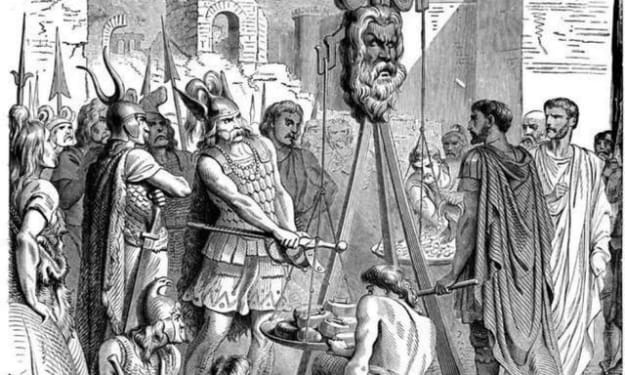French history
A free France was founded, and the flame of resistance was never extinguished

On May 10, 1940, German forces launched a major invasion of France. Within weeks, they captured Paris and threw France into chaos. So the capitulators led by Marshal Petain dominated the French situation.
The French resistance led by Charles de Gaulle contributed to the victory over Nazi Germany in 1945 and secured France's status as a great power after the war.
De Gaulle issued his Message to the French People in London
June 18, 1940, De Gaulle in London issued the "message to the French people" broadcast, called for continued resistance of the French army and people, "free France" movement began.
De Gaulle thus became the symbol of the French resistance and gradually became the sole leader of the French resistance movement.
Second, De Gaulle still advocated resolute resistance
After Germany blitzed Poland, there was no major military action on the western front, and France and Britain were happy to preserve the status quo and delude themselves with the pretence of peace.
Until the Germans began to attack on a large scale, the French and British forces were defeated, France was in chaos, and there was no way to organize an effective resistance. The French fled and the army surrendered in droves.
In the process, only De Gaulle, who was good at using armored forces, achieved some success, but it was difficult to do so alone. In the face of a crushing defeat, De Gaulle still insisted on resolute resistance, but most of the senior officials agreed with The French marshal petain's idea that an end should be stopped as soon as possible.
From the point of view of the situation at that time, the armistice is surrender, De Gaulle did not want to surrender, on June 17, France left for London, England.
The next day de Gaulle gave a speech saying that "whatever happens, the flame of French resistance cannot and will not be extinguished." Four more days later, in France, Marshal Petain signed an armistice and established the humiliating Vichy government.
Third, the cause of "free France" gradually grew
De Gaulle's speech did not at first receive much attention at home. But British Prime Minister Winston Churchill firmly supported de Gaulle and recognized him as "the leader of the free French."
German tyranny in France made the French people more and more dissatisfied, so the heart of the French people to De Gaulle more and more. The cause of "free France" grew.De Gaulle adopted a two-pronged strategy to establish himself as the leader of the French resistance. One was to win French overseas colonies, especially in French West Africa; The other was to make contact with the partisans in France.
De Gaulle first recruited soldiers in his West African colonies and soon built up an army of more than 7,000 men. Then de Gaulle won over anti-Vichy countries like Cameroon, and he took over by force some of the countries that didn't obey him, like Gabon. In October 1940, De Gaulle announced in Brazzaville the establishment of the Imperial Defence Council to exercise government functions. Large swathes of West Africa became free French territory.
Within France, guerrillas led by various forces, including the Communists, were active and had been fighting against the Invading German forces. Jean Mullan, de Gaulle's right-hand man, returned by air drops, organized and coordinated the internal resistance, and renamed the Free France the Fighting France to unite the fighting partisans. Jean Mullan managed to unite the various resistance forces and in May 1943 formed the National Resistance Council, recognizing De Gaulle as the sole leader.
Final victory for France
As a result, de Gaulle had the support of both domestic and foreign rebels.But the Americans threatened de Gaulle's leadership by supporting another German general, Giraud.So de Gaulle took the initiative to talk with Giraud and offered reconciliation, establishing the French National Liberation Committee in Algiers, North Africa, and the two of them as chairman. De Gaulle, however, had more supporters and soon sidelined Giraud, making de Gaulle the sole chairman of the Council for national Liberation. President Roosevelt was unhappy, but could do nothing about it.
Under de Gaulle, France built up a strong army with several armored divisions. During d-Day, fighting French troops returned with the Allies to the French mainland to fight for the liberation of France.
Domestic guerrillas were also very active. In August 1944, the French Communist Party promoted the Paris uprising and successfully defeated the German army. Before the arrival of the armored division sent by De Gaulle to support, Paris was basically liberated and the road welcomed de Gaulle back to Paris.
The French army made a great contribution to the liberation of France, liberating Strasbourg and other big cities. Tasini, commander of the First Army, signed the German surrender on behalf of the French government, symbolizing France's final victory.The Free France movement led by Charles de Gaulle successfully integrated the resistance forces inside and outside France, and made many achievements in the process of liberating France. Above all, the continued resistance of free France, while maintaining the government's surrender to Germany, ensured France's postwar status as a victorious power.
About the Creator
Enjoyed the story? Support the Creator.
Subscribe for free to receive all their stories in your feed. You could also pledge your support or give them a one-off tip, letting them know you appreciate their work.





Comments
There are no comments for this story
Be the first to respond and start the conversation.